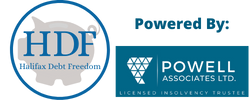How Much Debt Is Too Much Debt – Find Out Now

“How much debt is too much?” There are a couple of simple answers to that question:
(A) “More debt than I can pay is too much debt,” or,
(B) “The debt that I have now is too much debt.”
If that’s how you feel, then rest assured: you are not alone. Still, if we had to put a number on “too much debt,” what would it look like? We’ll throw out a couple of numbers that we feel are good markers for having too much debt, both in Canada in general, and in Nova Scotia in particular.
Debt can be a symptom of any number of problems and life circumstances. However, it is important to understand that YOU ARE NOT YOUR DEBT.
At Halifax Debt Freedom, we'd love to discuss how we can help you become debt free.
For Canada, having too much debt means owing $23,500 or more to creditors. For residents of Nova Scotia, in particular, too much debt equates to owing $22,600 or more. How did we come up with those figures? And what can you do to gain debt relief if you find yourself in a tough situation? The following information will answer those and other questions.
Statistics on Canadian Debt
To arrive at our figures above, we simply took the average debt per Canadian or Nova Scotian, and rounded up to the nearest hundred. Thus, both of those above-mentioned numbers in the bold letters represent above-average debt for the two groups, respectively; and we feel that above-average debt is definitely too much debt.
Let’s take a look at some other factors associated with Canadian debt in general:
- A Canadian’s average debt (not including mortgages) is $23,496. Canadians aged 18-25 have the lowest average debt at $8,677, while the age group from 46-55 has the highest average debt at $35,527.
- The Medium income for a Canadian household equals $5112.33 after taxes.
- On a national level, the delinquency rate for outstanding debts has risen by 3.5% since 2018. The national average now sits at approximately 1.12%.
- Statistics Canada found that household debt continues to rise faster than income. The debt to income ratio is now $1.79. That means for every $1 of income. an individual owes $1.79 of total debt, including mortgages.
Many experts are worried that we are seeing an upward trend of debt delinquency, as Canadians continue to rely heavily on debt in order to maintain their lifestyle choices.
Statistics on Debt in Nova Scotia
What about the residents of Nova Scotia? With regard to income, debt, and delinquency, there are some key differences between this particular province and the country of Canada as a whole.
- The average debt for a Nova Scotian comes out to $22,546.
- The average household in Nova Scotia makes $4427.42 per month. This income level is $684.91 lower than the national figure. Thus, Nova Scotians, in general, have slightly lower debt and a significantly lower monthly income than many other Canadians.
- With the two above points in mind, perhaps it comes as no surprise that Nova Scotia’s delinquency rate is 1.82%, or 0.7% higher than the national average.
If you find yourself facing debt trouble, what are some steps that you can take to procure relief for yourself?
5 Options to Relieve Your Debt
There are 3 debt relief methods that you can perform under your own power and 2 strategies that require assistance. The DIY debt relief methods include:
- Debt consolidation. This involves taking out a loan to consolidate your debt towards a single creditor. For instance, if you are dealing with multiple credit card debts, you can take out a bank loan to pay off the credit card companies, and then focus on repaying that single loan to the bank instead.
- Direct negotiations. If you have access to a lump sum of money, either through a high-paying job or months of saving, then you could attempt to reduce your debt burden through direct negotiations with your creditor(s). If you could pay off 80% of your debt in one lump payment, for example, then your negotiating partner may be willing to let the other 20% go. Be forewarned, though, that many creditors are inclined to reject such offers from consumers offhand.
- Self-discipline. This is the “long road” to debt relief. You’ll simply have to make sacrifices in your lifestyle, perhaps pick up additional work, and create a long-term plan to pay off your debt. While it can be done, it is by no means the easiest course to take.
The 2 debt relief methods that require outside help are:
- Consumer proposal. A consumer proposal is a legal form of you negotiating with your creditors. Filed through a licensed insolvency trustee, you will negotiate with your creditors to come to terms that are agreeable to both parties. Before embarking on this course, it is wise to seek unbiased professional advice as to the pros and cons of entering such debt negotiations.
- Bankruptcy. This should be your option of last resort. Again, you’ll need to file bankruptcy with a trustee. Before making this weighty decision, consulting with a professional debt relief agency is usually the course of wisdom.
In summary, our team believes that the answer to the question, “How much debt is too much?” is simple: the debt that you have right now is too much. In fact, the only debt that is not too much is zero debt.
We can help you to get there. If you’d like to learn more about the debt relief services that we offer, reach out to us today for further information.
This article was written by David Moffatt, a Debt Relief Expert. He has helped assist in creating plans that have helped save Nova Scotia residents over $30 million dollars of consumer and tax debt since 2015. We believe that no consumer should have to struggle with the stress of overwhelming debt. Our debt restructuring strategies can help you cut your debt by up to 80%.
If you are struggling with debt please reach out. It hurts to continue to suffer financially. Halifax Debt Freedom services Halifax, Dartmouth, Bedford, Sackville the entirety of HRM, and all of Nova Scotia.
Comments are closed.


2 Comments
Thank you David. Really good information. Straightforward and clear.
Thanks, Lori! Much appreciated.